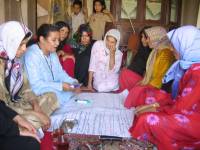Background and Objectives
Background
 Women CDC Meeting
Women CDC MeetingAfter two decades of war, Afghanistan's governance system has been weakened. In response, the Government of Afghanistan and UN-HABITAT have designed the National Solidarity Programme (NSP) which is initially aimed at strengthening the network of some 30,000 self-governing community institutions. The NSP has three objectives in empowering communities: (i) re-establishing relations between government and rural communities; (ii) providing grants for the reconstruction of physical and social infrastructure; and (iii) empowering communities and establishing community-level governance structures.
Objectives
UN-HABITAT is one of the Facilitating Partners for the NSP funded by the Government of Afghanistan and World Bank. Community Development Councils (CDC) are mobilized to prepare Community Action Plans and UN-HABITAT provides technical support for the development and implementation of these plans. Components include roads, drains, schools, health facilities and irrigation. The CDC forms an important part of local governance and the interaction between communities and District level administration. UN-HABITAT has been operating in 47 districts of 9 provinces with operations in 3,258 communities.
Activities
The National Solidarity Programme is implemented in five phases:
* Undertaking community awareness-raising and problem identification;
* Establishing Community Development Councils. Council members are voted in through secret ballot and must be aged above 20 years. Each elected member represents 28 eligible voters;
* Preparing and endorsing a Community Development Plan and setting up a Community Savings Box;
* Preparing designs for community projects and submitting proposals;
* Implementing projects including monitoring, evaluation and reflective project learning.
Results
- ・The target of establishing 8,334 CDC was exceeded by 124%
- ・More than 50% of women participated in their local CDC election, against a target of 40%
- ・The target of 90% of communities contributing 10% of project costs on average was passed with 100% of communities contributing 14.5% on average
- ・The target of 1,260,000 beneficiary families was out performed by close to 1 million additional families (2,216,917)
- ・Labour days created by NSP Sub-projects totalled 14.4 million exceeding the target of 9.7 million –almost 50% above target
- ・472,234 community members were trained, around 79,000 more than targeted.
Development Partners / Partners
Development Partners: Government of Afghanistan, World Bank
Partners: Ministry of Rural Rehabilitation and Development (MRRD); Provinces of Kandahar, Farah, Herat, Bamyan, Parwan, Kapisa, Balkh, Panjshir, Nangarhar
- Overview
- Community Development Project: National Solidarity Programme (NSP)
- Afghanistan Urban Peacebuilding Programme (AUPP)
- Future of Afghan Cities Programme (FoAC)
- Kabul Solidarity Programme Phase 2
- Community-Based Municipal Support Programme
- Kabul Solidarity Programme
- Developing Irrigation Associations for On-Farm Water Management Project
- Behaviour Change Communication
- Assessment of Options for Community Benefit Sharing for CASA-1000
- Urban Solidarity Programme
- Reintegration of Returnees and IDPs through Policy, Planning and Targeted Assistance (EU8)
- Strengthening Municipal and Community Development in Lashkar Gah – Phase III
- Peace-Building in Afghanistan through Consolidation of Community Solidarity (PACCS)
- Reintegration of Returnees and Internally Displaced Persons (IDPs) through Policy, Planning and Targeted Assistance (EC7)
- Strengthening Municipal and Community Governance in Lashkar Gah - Phase II
- Community Empowerment and Development for Peace Building
- Learning for Community Empowerment Programme (LCEP Phase 2)
- Reintegration of Returnees and IDPs through Policy, Planning and Targeted Assistance (EC6)
- Behaviour Change and Communication
- Governance and Development Support Programme in Kandahar (GDSP)
- NSP - Spinboldak and Khakrez in District of Kandahar
- Upgrading Informal Settlements in Kandahar City
- Youth Empowerment Project (YEP)
- Inter-Communal Rural Development Project (IRDP)






































